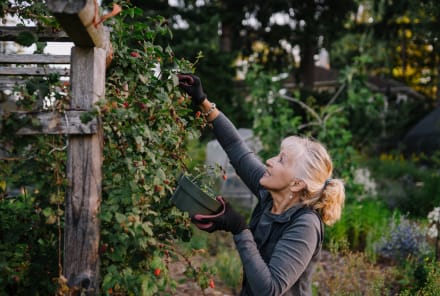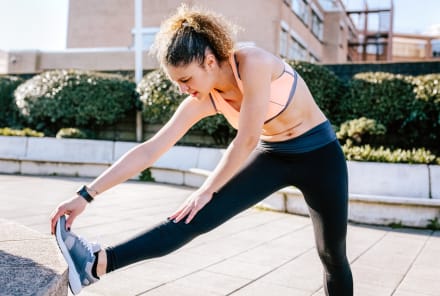Advertisement
How I Avoid A Hangover: What To Do Before, During & After Drinking Alcohol

As someone who had their share of boozy nights before quitting drinking in 2010, I know what it's like to be left with a nasty hangover. And while I've never felt better since giving up alcohol completely, I know that most of us still want to enjoy a drink or two — without harming their health or suffering a major headache the morning after.
So here's what I recommend you do before, during and after drinking alcohol to help limit the damage:
What to do before you have a drink:
1. Commit to your exact limit.
Try this: Don't think about a pink elephant. Impossible, right? Similarly when you think, “I’m not going to get drunk,” it’s impossible to stop thinking about getting drunk. Your mind is wired for reward and novelty.
So instead, focus on the positive by thinking, “I easily can only drink two drinks and lot's of water,” or whatever works best for you.
2. Make plans for the next morning.
If you’re conscious of a 7 a.m. commitment, you’re more likely to leave the bar early. It could be your favorite exercise class, running errands, or grabbing coffee with a friend. It’s a good excuse to make an early exit.
3. Prepare a healthy pre-drink meal.
You’ll feel the effects of drinking more if you haven’t eaten anything beforehand, since alcohol is absorbed from your stomach. Slow down the metabolism process by filling up with protein and high-fiber foods like asparagus, broccoli, and cauliflower.
When preparing your pre-drinking meal, ask, “Are there health-giving benefits to this product? Did it once live, grow or swim? Have ingredients been added to the original product?” Answering in the positive means your meal will likely be antioxidant-rich, which helps the liver.
What to do while drinking:
1. Slow down.
Drink slowly and aim to have no more than two drinks in three hours. To keep busy, focus on creating great conversation by asking ice-breakers like, “What’s your story?”
2. Alternate drinks.
For every alcoholic drink, order a glass of water with ice and fresh lime — it's an excellent source of Vitamin C and adding some flavor will likely help you drink more. You can also consider adding an effervescent electrolyte (you can pick them up at most drugstores) to further help prevent dehydration.
3. Head home by 1 a.m.
Nothing good happens after 1 a.m. When I was a social drinker, I got into the most trouble between 1 a.m. and 4 a.m. After the 1 a.m. buzz of going to a new party, I’d be eating a slice of pizza or a pack of Doritos by 3 a.m. I’d drink more beer and sometimes smoke cigarettes. Now I have a firm 1 a.m. cut-off for when I head for home.
What to do after drinking:
1. Drink a hangover smoothie.
A smoothie gives you bang for your buck: quick to make, convenient, nutritious, simple and tasty. Blend some coconut water (to help with hydration), protein powder, frozen berries and a handful of spinach.
After drinking, your body will be inflamed — so also consider spicing up your smoothie with these healing herbs and spices:
2. Don’t take ibuprofen.
If you can, avoid taking medications like ibuprofen, since they can have some nasty side effects, like stomach pain, digestion issues and nausea.
3. Stay hydrated (but not with Gatorade).
Alcohol is a diuretic, so it's important to drink lots of water before, during and after drinking. But avoid Gatorade — some varieties contain as much as 21 grams of sugar! If you’re sitting around, this can cause a big insulin spike.
Instead, get electrolytes from mineral-rich water. Coconut water is also a great option, because of its electrolyte content (including potassium) and ability to help you hydrate quickly — and avoid headaches.
4. Eat eggs.
There's actually some sicence behind the idea of frying up some eggs the morning after: The amino acid, cysteine, contained in egg yolks assists your liver in breaking down acetaldehyde from alcohol.
So there you have it: simple and easy things to do before and after drinking. If you feel overwhelmed by the number of tips, just pick one or two to experiment with and find out what works best for you.
Watch Next
Enjoy some of our favorite clips from classes
Enjoy some of our favorite clips from classes
What Is Meditation?
Mindfulness/Spirituality | Light Watkins
Box Breathing
Mindfulness/Spirituality | Gwen Dittmar
What Breathwork Can Address
Mindfulness/Spirituality | Gwen Dittmar
The 8 Limbs of Yoga - What is Asana?
Yoga | Caley Alyssa
Two Standing Postures to Open Up Tight Hips
Yoga | Caley Alyssa
How Plants Can Optimize Athletic Performance
Nutrition | Rich Roll
What to Eat Before a Workout
Nutrition | Rich Roll
How Ayurveda Helps Us Navigate Modern Life
Nutrition | Sahara Rose
Messages About Love & Relationships
Love & Relationships | Esther Perel
Love Languages
Love & Relationships | Esther Perel
What Is Meditation?
Box Breathing
What Breathwork Can Address
The 8 Limbs of Yoga - What is Asana?
Two Standing Postures to Open Up Tight Hips
How Plants Can Optimize Athletic Performance
What to Eat Before a Workout
How Ayurveda Helps Us Navigate Modern Life
Messages About Love & Relationships
Love Languages
Advertisement

Research Shows Cognitive Longevity Depends On These 3 Critical Vitamins
Molly Knudsen, M.S., RDN

This Lowers Signs Of Inflammation After Menopause, Study Finds
Molly Knudsen, M.S., RDN

Research Shows Cognitive Longevity Depends On These 3 Critical Vitamins
Molly Knudsen, M.S., RDN

This Lowers Signs Of Inflammation After Menopause, Study Finds
Molly Knudsen, M.S., RDN

Research Shows Cognitive Longevity Depends On These 3 Critical Vitamins
Molly Knudsen, M.S., RDN

This Lowers Signs Of Inflammation After Menopause, Study Finds
Molly Knudsen, M.S., RDN

Research Shows Cognitive Longevity Depends On These 3 Critical Vitamins
Molly Knudsen, M.S., RDN

This Lowers Signs Of Inflammation After Menopause, Study Finds
Molly Knudsen, M.S., RDN














